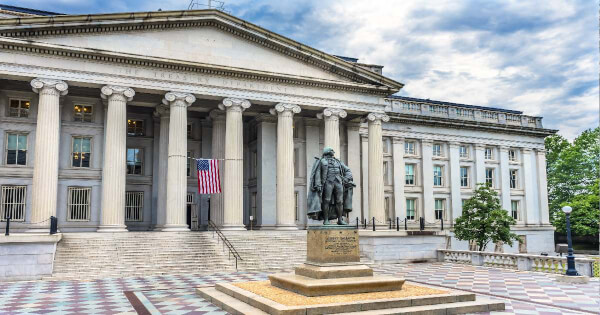U.S. Embraces Crypto with Strategic Bitcoin Reserve and Stablecoin Regulation
News Publisher Sep 02, 2025 08:48
As global interest in digital assets surges, the United States is making bold moves to embed cryptocurrencies into its financial and regulatory framework.

As global interest in digital assets surges, the United States is making bold moves to embed cryptocurrencies into its financial and regulatory framework. Two recent developments—the establishment of a Strategic Bitcoin Reserve and the signing of the GENIUS Act—highlight Washington’s transformative shift toward crypto integration.
There’s also a change in public attitude towards crypto, as more traditional businesses and individual investors are including crypto as part of their portfolio. This has led to an increased interest in crypto by regulatory agencies. The EU already has comprehensive regulatory measures in place, and the US is trying to catch up with new legislation.
A Sovereign Crypto Reserve: The Strategic Bitcoin Reserve
In March 2025, President Trump signed an executive order establishing the Strategic Bitcoin Reserve and United States Digital Asset Stockpile, positioning Bitcoin and other digital assets as national reserve holdings alongside traditional assets such as gold. This initiative mandates that federal agencies account for digital assets and consider transferring forfeited coins into this reserve—marking the first time Bitcoin is treated as sovereign property in U.S. policy.
By August 2025, the U.S. had amassed an estimated 198,000 BTC, making it the largest state-held Bitcoin reserve globally. Turning crypto into a strategic asset, rather than a speculative one, shows that crypto is at the forefront of this administration’s financial policy. It boosts the market, but it’s also worrying to those who got into crypto to escape government control.
Regulating Stablecoins: The GENIUS Act Takes Effect
Parallel to sovereign holdings, the U.S. is pushing regulation in the stablecoin market. The legislation mandates full-reserve backing, monthly audits, and AML-compliance for stablecoin issuers—establishing critical transparency and consumer protection standards.
By limiting the Federal Reserve’s ability to issue a CBDC and clarifying oversight roles between federal and state regulators, the bill aims to promote innovation while curbing risks.
Several governmental agencies are now involved in regulating the stablecoin market. This includes the Treasury Department, the SEC, and state-level regulators. Many have felt that the uncertainty surrounding stablecoins is causing them to lag behind traditional cryptocurrencies. With the new legislation in effect, there will be fewer such issues to worry about.
Institutional and Global Context: A Crypto Momentum
These developments don’t exist in isolation. Hedge funds, family offices, and institutional investors, particularly across Asia, are increasingly allocating crypto in their portfolios. Reports suggest Asian wealth managers plan to allocate up to 5% of assets to digital currencies, supported by regulatory frameworks like the U.S.’s GENIUS Act and Hong Kong’s stablecoin laws.
Meanwhile, global markets continue to see institutional adoption in areas such as Bitcoin ETFs, tokenized assets, and DeFi infrastructure. Regulatory clarity has propelled secondary Bitcoin investments—like ETFs and futures—while tokenization of real-world assets such as real estate and stocks expands accessibility and liquidity across borders.
Staying Informed
With growing interest in crypto and increased government involvement, crypto investors must stay informed about the evolving landscape. It’s more than just an interest in public policy; the changes can affect day-to-day investment practices.
Outlets such as Cryptomaniaks have provided direct coverage of the latest legislation, as well as the public reaction to it. It featured opinions from decision-makers, key industry figures, and both those who support and oppose further government involvement.
Implications for the Crypto Market
Legitimization of Crypto
Treating Bitcoin as a reserve asset elevates its status—much like gold—firming its place in sovereign and institutional portfolios. However, when crypto is taxed, it’s treated differently from profits made from forex trading.
Stablecoin Credibility
The GENIUS Act brings legitimacy to stablecoins: now backed with transparency and regulatory safeguards, their use in payments, DeFi, and cross-border transfers becomes more mainstream. Stablecoins used to be seen as an instrument within a portfolio, used to mitigate risk and from now on, they’ll be used as an asset in themselves.
Stimulated Institutional Engagement
Regulatory clarity and institutional adoption (e.g., ETFs, tokenized assets) reduce barriers to crypto investment, inviting broader participation from traditional finance. In a way, this has started happening on its own and the government just caught up.
Global Ripple Effects
As the US models crypto integration, other countries are responding. For instance, Pakistan’s 2025 launched its own Strategic Bitcoin Reserve and regulatory authority. The EU has had regulations in place before the use and the Gulf Countries are joining as well.
Conclusion
With the U.S. establishing a formal Bitcoin reserve and rolling out comprehensive stablecoin regulation via the GENIUS Act, crypto isn’t just a speculative market—it's becoming part of the official financial architecture.
For those navigating this evolving landscape, platforms like CryptoManiaks offer crucial guidance. As digital assets increasingly intersect with policy, finance, and global governance, staying informed is more important than ever.
Image source: Shutterstock
.jpg)